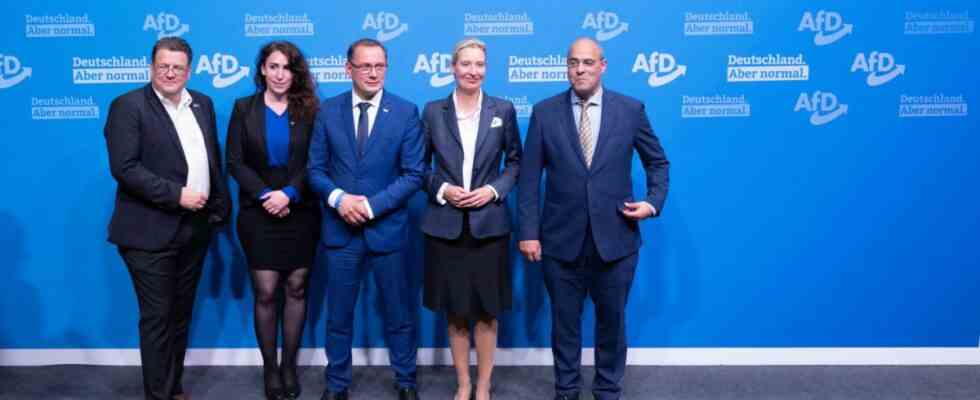The message that the AfD sent from its party conference in Riesa this weekend was pretty clear: the extreme right is back. And they are very self-confident. They formulated their claim to power, spoke into the microphones more often than they had in a long time and asserted themselves at crucial points. They also managed to further tighten the content of the AfD program. In the end, that went too far even for the new board. The party conference ended in dispute and was canceled before all the issues could be dealt with.
exit from the EU
The dispute was mainly sparked by the European policy that the AfD wants to pursue. In its election program last year, the party already declared that it was necessary to leave the EU. The alliance cannot be reformed. According to the election program, the party wants physical barriers at the national borders to secure the borders – it would like to reintroduce border fences.
On Sunday afternoon, the party congress discussed at length a motion supported by Björn Höcke on the future of Europe, which, in the style of conspiracy theorists, was intended to exacerbate the rejection of the institutions. “The euro zone will be dissolved in an orderly manner,” said the paper, which downplayed Russia’s war against Ukraine as the “Ukraine conflict.” The European Central Bank should also be dissolved.
The delegates thus embarrassed the newly elected party leadership of Tino Chrupalla and Alice Weidel, who desperately tried to prevent a vote on the explosive motion, which Weidel described as unacceptable in this form. The motion also warned that Europe’s populations would be “subjected to the educational program of political correctness.” Ukraine’s NATO membership should be prevented for the time being and an “equilibrium with Russia” created. Because Europe has a natural interest in good relations with Russia.
During the debate, even delegates warned against adopting Russian propaganda in this form as an AfD position. Because neither side wanted to give in, the application was referred back to the board, which must now clarify the differences. The mood among the delegates was so bad because of the dispute that the party conference ended without working through the remaining items on the agenda.
Cooperation with right-wing organizations
The decision by the delegates to remove the right-wing union “Zentrum” from the AfD’s incompatibility list had already caused a stir on Sunday. The AfD leads organizations and clubs whose members are denied access to the party – mostly because they have contacts in the right-wing extremist milieu. Federal board member Marc Jongen pointed out that as long as representatives of the “centre” held events with the NPD and the right-wing extremist party III. way, the state association does not want any cooperation at the moment. Those responsible would first have to remove “toxic people” from the board.
Thuringia’s head of state Björn Höcke, on the other hand, advocated removing the club from the incompatibility list. Such “approach organizations” are also needed outside of parliament, otherwise the party will not “break through”. Höcke rejected the warning from his own ranks that the Office for the Protection of the Constitution could use the decision against the AfD with a remarkable justification. The “so-called protection of the constitution” is part of an “instrument of power that our Germany wants to liquidate”. Therefore, one should not worry about the assessments of this authority. The party itself determined who was an extremist, said the politician, who was classified as a right-wing extremist by the Office for the Protection of the Constitution. “No government agency does that for us.”
The majority of the delegates finally followed his reasoning. Around 60 percent of them voted to remove the “Gewerkschaft Zentrum” association from the list.
Nuclear power, yes please!
The AfD also wants to make energy policy a big issue in the future. It passed a resolution on the construction of new nuclear power plants in Germany. “End ideological energy policy – new nuclear power plants for Germany,” says a resolution passed by the 550 delegates with a large majority. “Modern nuclear power is one of the most important building blocks in the energy mix of the future,” says the AfD. The nuclear power plants Isar 2, Emsland and Neckarwestheim 2 are still connected to the grid in Germany. They are also to be shut down by the end of the year. Even the continued operation of these power plants is controversial in Germany. Federal Finance Minister Christian Lindner (FDP) recently said that a debate about a return to nuclear power should not be closed off. The Greens politicians in the cabinet and Chancellor Olaf Scholz (SPD) have rejected an extension of the terms because of the consequences of the Russian invasion of Ukraine.

